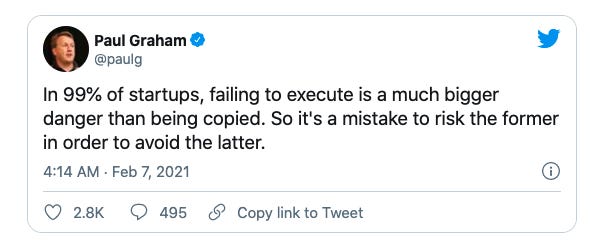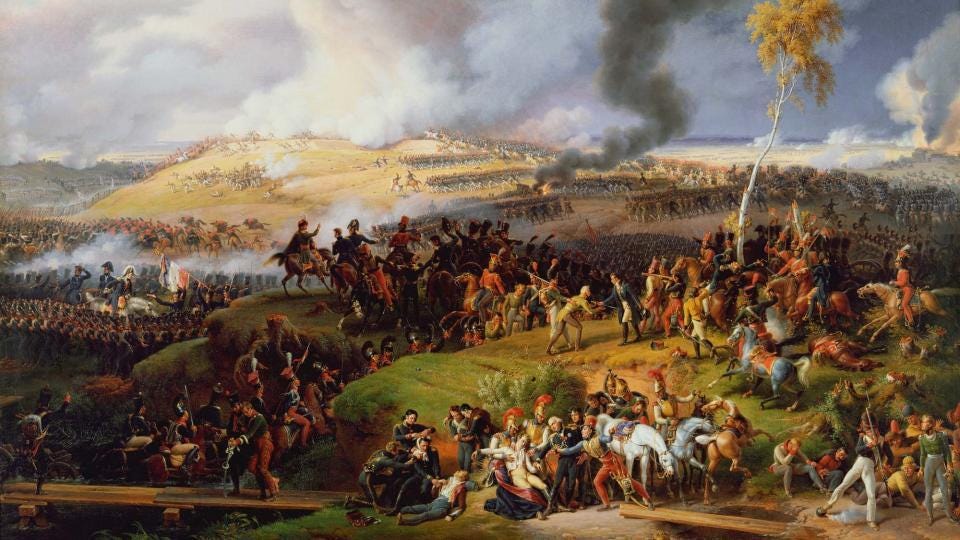#96 - Relevant
Not relevant, relevant, and friction
I’ve read a few books on war recently.
I know what you’re thinking:
Another white male reading about war. The last thing the world needs.
Hear me out.
War certainly shouldn’t be discussed lightly. Or glamorised, which it often is.
But I do think it’s relevant to a startup founder.
Welcome new readers! If you’re reading this but haven’t subscribed you can subscribe here:
Not Relevant
Let’s start with where it’s not relevant:
Competition.
War is a zero sum game. One side against another. It can often feel like that with startups but it’s not true.
With startups you’re competing against yourself. Execution is the real challenge. Competition might even help you execute.
Paul Graham sums it up nicely:
It comes down to what game you’re playing: Finite or infinite.
In a finite game you’re playing to win. The other players are competitors. There are rules. A clear end to the game. You win or you lose.
In an infinite games you’re playing to play. The other players are collaborators. There are no rules. No defined end. You play as long as you like.
War is a finite game plan and simple.
As for startups? It’s up to you.
Treat it as an infinite game and it will be.
Relevant
It is relevant, however, as a lesson in doing hard things.
Startups are hard. Surprisingly so. I’ve met many an entrepreneur who said they wouldn’t have started if they’d known.
It’s not entirely obvious why they’re so hard.
On the surface it’s simple: Create a product, sell it, make more money than you spend. Easy. Right?
But something goes wrong. Always.
There’s little comparable in the modern world.
But there’s thousands of years of literature on war.
War is far harder than startups. Unsurprisingly. It’s a uniquely complex affair.
Much can be learnt from how our predecessors dealt with that complexity.
Friction
I’ll leave you with an example.
It appears in Carl Von Clausewitz’s classic: On War.
It’s a four-page chapter called Friction in War (p.66).
I’m not sure a more insightful four pages for startups exists.
Everything is very simple in war, but the simplest thing is difficult. These difficulties accumulate and produce a friction which no man can imagine that has not experienced war.
The friction of startups is nothing on the friction of war. But it clearly exists. That invisible force that you only understand once you personally experience it.
Recognising and accounting for this friction is the key.
The knowledge of this friction is a chief part of that so often talked about, experience in war, which is required in a good general.
…but a general must be aware so that he may overcome it, where that is possible, and that he may not expect a degree of precision in results which is impossible on account of this very friction.
It’s about keeping your head to navigate this friction.
Strength of mind alone can guide you through.
I’m still, to this day, surprised when my best laid plans don’t come to pass. Always. But it is dawning on me that that’s part of the game.
One simply must plan accordingly.
My Week in Books📚
On War by Carl Von Clausewitz
A slog at times, I’ll be honest. Lots of details to wade through. But also brilliant. The quality of insight is top class if you look hard enough.
Book two of a monthly book club w/ Hector Alexander. Next up the daunting History of the Peloponnesian War.
I’ll be updating the books I’ve read this year here. Any recommendations? Let me know! See 2021’s books here.
A Final Thought 💡
“Starting a company is like jumping off a cliff and assembling a plane on the way down.”
- Reid Hoffman



